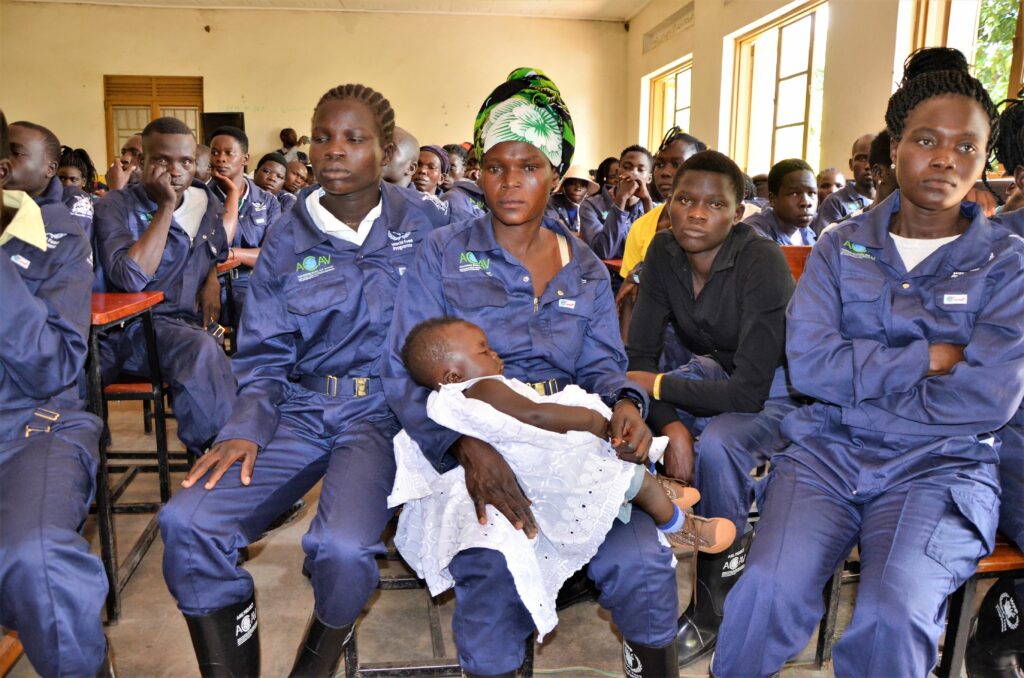By Robert Ariaka
A group of youth from the Lobule refugee settlement and host communities in Koboko district have attained skills on modern farming practices in horticulture as a business.
The two-month skills training in modern ways of growing horticultural crops brought together youth who are orphans, single mothers from host communities and refugees.
The training is to empower the youth to become self-reliant and undertake agriculture as business alongside fighting food security for refugees and host communities.
The youth were trained for two months at Jabara Agricultural College in Koboko. On Friday the youth were passed out and received start up tools to grow horticultural crops to earn a living.
Through the Agriculture market support project, ACAV received funding of 756 million US Dollars which helped them train and support over 200 youth in the last two years with skills and start up tools.
This will promote value chain and food security for the families. The production is mainly for business and the family will consume the excess and improve on their nutrition.
Swaib Asiraf from Jongule village in Lobule Sub County says he has learnt a lot and decided to undertake growing cabbages. He says the skills have changed his life and this will support his family.
According to Asiraf, cabbage has a ready market and calls on the idle youth to embark on farming to avoid laziness.
Brian Alafi, a refugee from Lobule settlement said the skills will enhance the food ration reduction. He took on watermelon, tomatoes and cabbages as his enterprise.
“Vegetables are good and I know back home it will help me” Alafi said. As a boda boda rider who also joined farming, Alafi says refugees would earn from the maize production alone, but vegetable growing will improve on their food support.
The food ration has reduced and the training will help us train others and bridge the gap of food ratio.
Each person gets Sh14,000 for a month and this money is little, forcing a number of refugees to repatriate to Congo.
The challenge of land shortage remains an obstacle for the refugees who want to embark on large scale farming forcing them to rent from the locals.
Grace Maneno is a refugee from Lobule who believes the skills she has attained will change her approach to farming. As refugees, we face the challenge of farming. The refugees are settled on 30 by 30 land size.
The refugees pay Sh150,000 to rent land from the host communities for one acre for a season which is expensive.
Daniel Amule, the program officer for the Agriculture Market support project at ACAV says the support will help the youth come out of the laziness and drug abuse but embark on farming as a business.
“The aim is to support both the refugees and host communities in skilling the youth to have self-reliance in agricultural production” Amule said.
Some of the youth are orphans while others are single mothers. He appeals to communities to learn from the youth who are practically involved in farming and expand their knowledge.
Hope Abalo, the Program Associate Agriculture Market Support with WFP challenged the youth to grow more greens and sell to boost their local economy.
She notes that the people of West Nile have continued to complain about bad soils for horticultural crops but advises them to use the skills attained to change the production.
Abalo asks ACAV to profile the success stories of those who are doing well and transforming the communities.
Samuel Abio, the Senior Agriculture of Officer Koboko says the extension workers will follow the graduates and support them with extension services to change the community.
He appeals to the parents of the youth to support them with land to expand on the production of greens and earn money.
Abio commends ACAV for supplementing government efforts of skilling the youth which he says goes a long way in changing the society.






